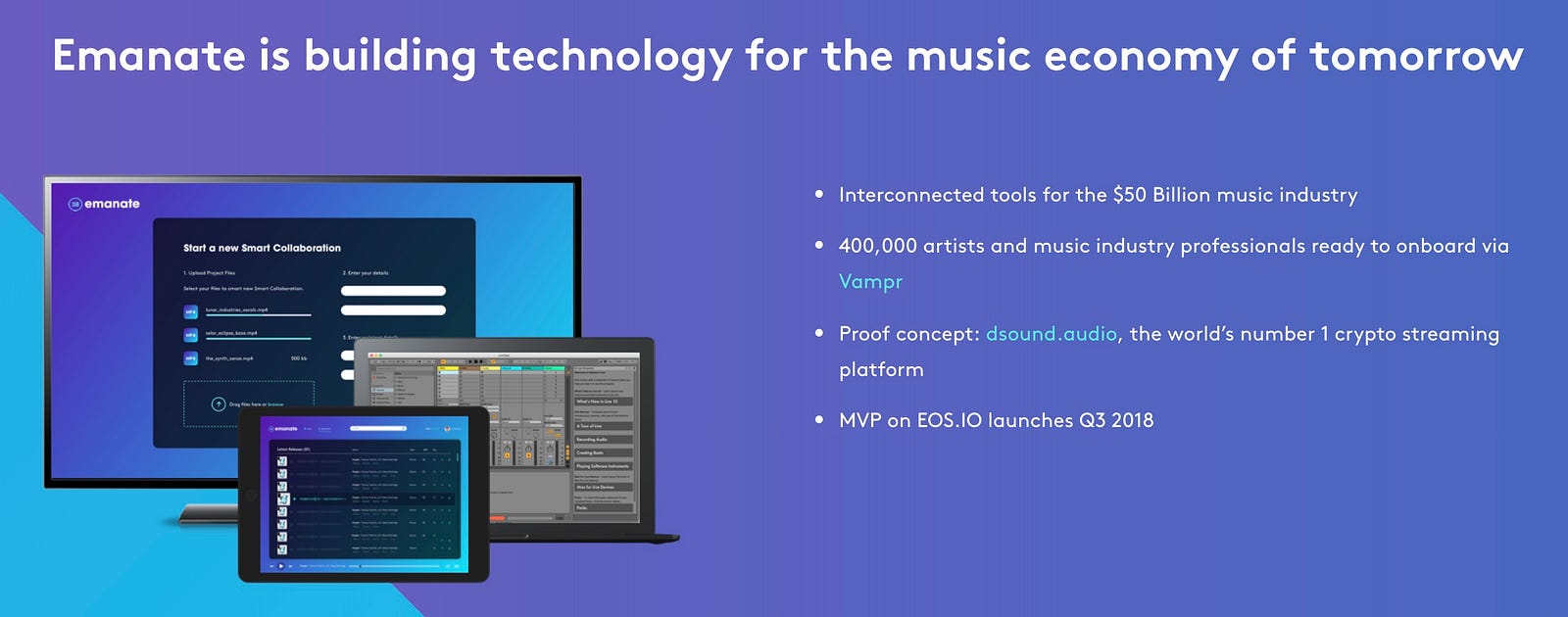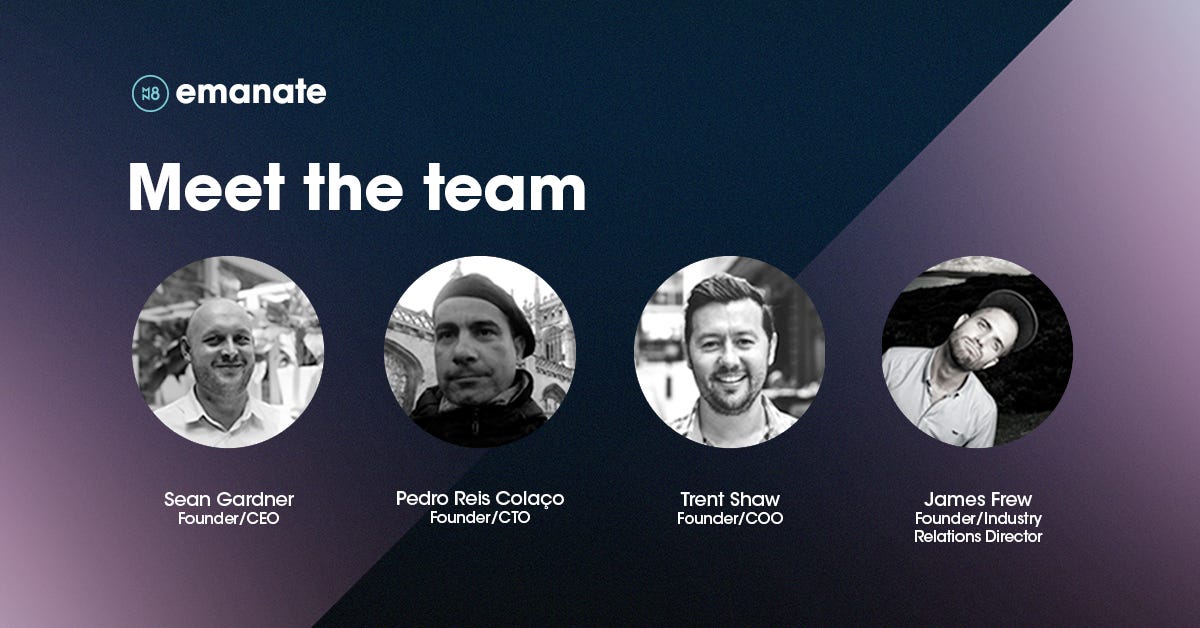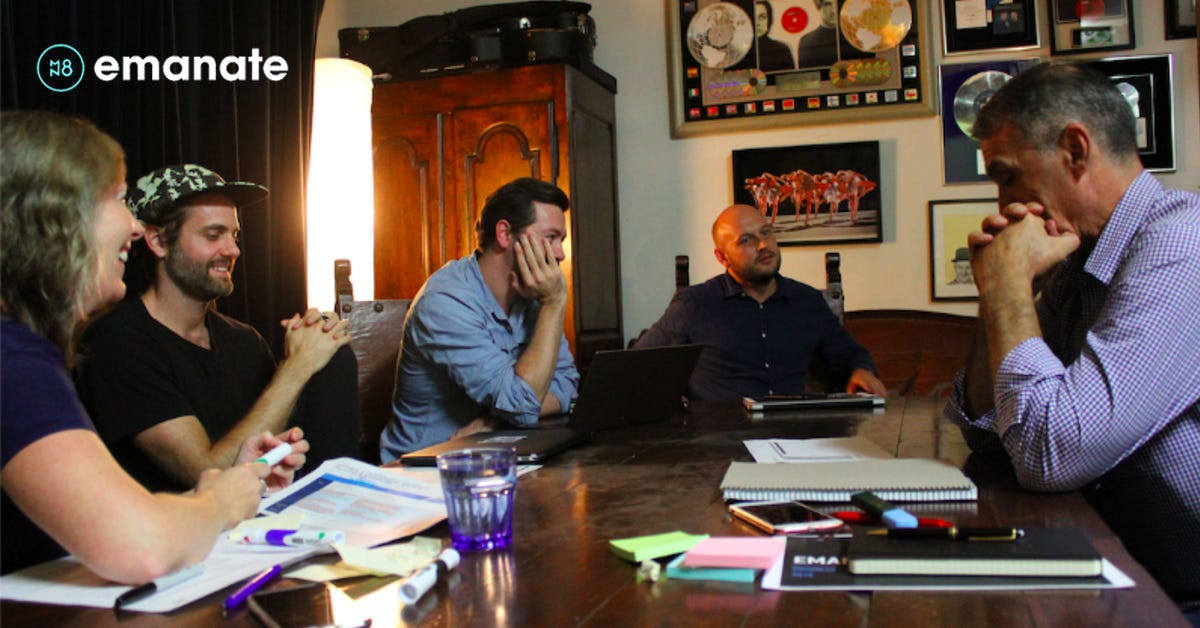译文/Translated:
我们将DAPP重心转移到音乐流媒体公司,并将合作网络迁至EOSIO
“挣扎的音乐人”这一措辞已然成为我们时代词汇的一部分,并且有些老生常谈了。不错,音乐人从未普遍地获得大量财富,但不可否认的是数字时代打破了传统的收入模式,甚至在这个时代想要扩散或找到新的音乐变得更加简单。
通过逐步发展支付流媒体模式,利用规模经济,新的音乐人必然以行业巨人的姿态诞生。但这使占据市场巨大份额的流行巨星与其他人之间的鸿沟不断加深。而普遍认为,音乐人中通过售卖录制音乐谋生的“中产阶级”出现缩水。
看看悉尼,澳大利亚团队Emanate。他们正在构建被称之为“音频交换协议”(Audio Exchange Protocol)的东西,Emanate的首席执行官Sean Gardner解释道:“这会将音乐社区拉回它们世界的中心“。
Emanate主要是将两种想法融合。第一种是分散型流媒体平台,它在听众听音乐时,让音乐人能实时获得收益。第二种是更多潜在的转化性:它通过区块链的“智能合作”合约,让艺术家无论在世界哪个角落,甚至不需要彼此之间相互信任都能够合作共事。
“每一次艺术家们合作合约的执行都是在总账上进行”,“这为艺术家们带来了合作的透明度,对于音乐制作人和唱片公司而言,则加速了与多方周旋和长期谈判的速度。”

该平台的流媒体已经在dsound.audio有了概念验证。被称为“区块链驱动的音乐货币化领先平台”,dsound由Emanate首席技术官PedroReisColaço在Steemit上创建.Steemit是Block.one的Daniel Larimer在EOSIO之前联合创立的网络之一。
据Gardner所言(他曾在Redbull,Adidas和Volkswagen等公司的品牌市场和数字创新方面工作过),Emanate将技术推向另一个层面,为切实可行的去中心化自治组织(DAO)奠定了基础。
“我们认为网络上应该有一个地方,让艺术家能够上传最终音轨,在那里他们能够合作并且融入其他系统,深入并最终让支付能够实时回到自己的手上。”他这样说道。
公司最初的动力来自哪里?Gardner说自己与联合创始人在发现区块链这一革新性引导技术之前,多年以来锁定了一个想法 – 构建“一类实时音乐交易”。或许是因为“就某些层面来讲,我们更像音乐人“。

除了Gardner和Colaco,核心成员包括首席运营官Trent Shaw,和行业关系总监Jimi Few,他们作为单独的电子音乐创造者,制作人,DJ和企业家,成功的事业为他们带来了独到的见解。四人一起经历了跨技术管理,软件工程,音乐制作,音乐商务,市场营销等方方面面。
目前该公司正在集资构建最简化可实行产(MVP),准备发布。与Vampr.me签署战略合伙协议为此次集资添了一把火.Vampre.me是一个移动平台,获封Apple“2017最佳App“,它促进了音乐的发现,以及音乐人,行业专家之间的沟通。”此次合作代表平台一旦落成便已拥有400,000位艺术家参与,“Gardner说道,”Vampr每日有1,700位新用户加入,因此我们很高兴能够与其进行合作“。

这些艺术家们(以及其他用户)将能够上传原始音轨,或节录乐曲 (sample),以寻求合作或快速货币化。他们将能够分享自身作品,并且不需要握手协议或私下支付抽成便能获得收益。即便他们生活的地区进行传统音乐“商务”的资源有限,他们也能够加入到新的无边界音乐生态系统中来。
Emanate估计全球有五百万专业音乐人。而可扩展性必然是团队前景的根本。“EOS是唯一能处理Emanate所需的吞吐量的区块链,”Gardner说道。每一秒的交易诠释成音乐人以每分钟的节奏重建经济,这样看前景确实令人兴奋。
原文/Original:
We turn our DAPP spotlight on the company that’s building a music streaming and collaboration network on EOSIO
The phrase “struggling musician” has become so much a part of the vocabulary of our times that it’s almost a cliché. Musicians were never universally rolling in cash, granted, but it’s undeniable that the digital age has disrupted traditional revenue models, even as it has become easier than ever to disseminate and find new music.
Inevitably, new players have emerged as industry giants by evolving paid streaming models that leverage economies of scale. This has led to a widening chasm, however, between pop’s superstars, who carry off the vast majority of the pie, and the rest. The ‘middle class’ of musicians who are able to make a good living by selling recorded music is generally understood to have shrunk.
Step forward the Sydney, Australia-based team behind Emanate. They’re building what they refer to as an “Audio Exchange Protocol” which — according to Emanate’s CEO, Sean Gardner — will “put the music community back at the center of their world.”
Emanate essentially brings two ideas together. The first is a decentralized streaming platform that allows musicians to earn money in real-time as their music is accessed by listeners. The second is potentially more transformative: it allows artists to work together, via “smart collaboration” contracts on the blockchain, wherever they are in the world and without the need for “trust” between parties.
“Each time artists collaborate an agreement is executed on the ledger,” explains the one-pager on the Emanate website. “This brings clear transparency to the artists, and for the music producers and record labels it expedites the processes of dealing with multiple parties and long negotiations.”

The streaming part of the platform already has the ultimate proof-of-concept in dsound.audio. Described as “a leading blockchain-powered music monetization platform,” dsound was built by Emanate’s Chief Technical Officer, Pedro Reis Colaço, on Steemit, one of the networks co-founded by Block.one’s Daniel Larimer before he started working on EOSIO.
According to Gardner, who previously worked in marketing and digital innovation for brands such as Red Bull, Adidas and Volkswagen, Emanate takes the technology to the next level, laying the foundations for a viable Decentralized Autonomous Organization (DAO).
“We think there should be one place on the internet for artists to upload final audio tracks where they can be collaborated on, integrated into other systems, embedded and ultimately allow payments to flow back to the originators in real time,” he says.
So where did the original motivation for the company come from? Gardner says he and his co-founders had knocked the idea of building “some sort of real-time sound exchange” around for years before lighting on blockchain as the game-changing, bootstrap tech that could make it work. It probably also helped that “we were all musicians in some respect, some more than others.”

Besides Gardner and Colaço, the core team includes COO Trent Shaw, and Industry Relations Director Jimi Frew, who brings unique insights from a successful career as an independent electronic music creator, producer, DJ and entrepreneur. Together, the four friends have experience across technology management, software engineering, music production, the music business, marketing and more.
The company is currently raising funds and building toward having a Minimum Viable Product (MVP) ready for launch. Signing a strategic partnership with Vampr.me, a mobile platform that was named among Apple’s “Best Apps of 2017,” and which facilitates music discovery and communication between musicians and music industry professionals, has added momentum. “The partnership means we have over 400,000 artists ready to onboard to as soon as the platform is ready,” says Gardner. “Vampr is growing by 1,700 new users every day so we’re excited to be a part of that.”

Those artists, and others, will be able to upload original tracks, or samples, for collaboration and rapid monetization. They will be able to share their work and get paid for it without having to rely on handshake agreements and percentage splits worked out on the backs of envelopes. And if they live in countries where access to the traditional music “business” is limited, they’ll be able to join a new and borderless musical ecosystem.
Emanate estimates that there are some five million professional musicians globally. And it’s clear that scalability is fundamental to the team’s outlook. “EOS is simply the only blockchain that is able to handle the kind of throughput that a project like Emanate will require,” says Gardner. Transactions per second translating to musicians rebuilding the economy around their beats per minute is an exciting prospect indeed.
原文链接/Original URL: